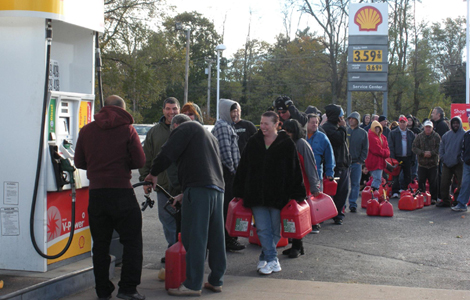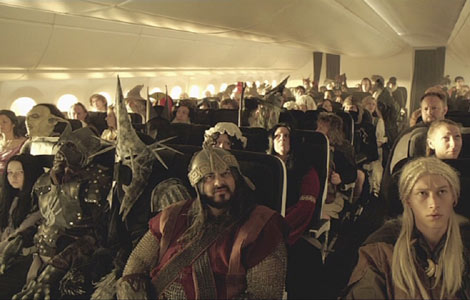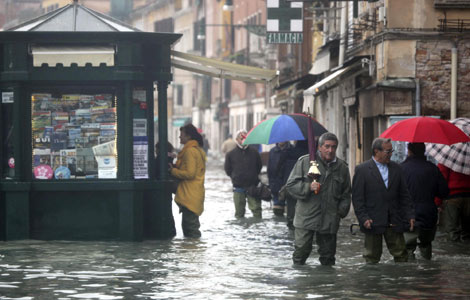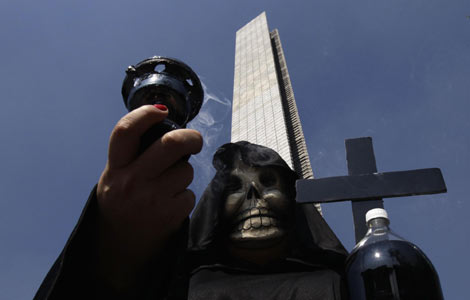
The results of the upcoming presidential election in Venezuela would have regional effect since the incumbent President Hugo Chavez is a leading figure in Latin America's left-wing movements, an analyst said on Friday.
If Chavez wins, it would contribute to the strengthening of the "anti-imperialist" left-wing trend of some Latin American governments, political analyst Carlos Cordero said.
"Anti-imperialism", when used by Chavez, usually means reducing US influence in the region. Other leaders use the term to mean boosting domestic control over the economy compared to that exercised by former colonial powers from Europe.
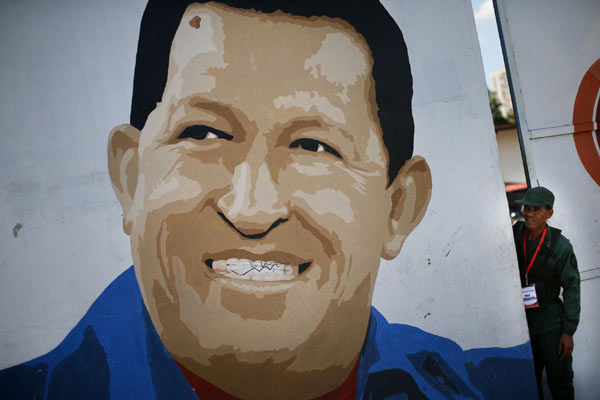 |
|
A soldier stands near a door next to a campaign mural of Venezuelan President Hugo Chavez in Caracas, Oct 6, 2012. [Photo/Agencies] |
Cordero, a political science professor from Bolivia's Higher University of San Andres, said the democratic victories of Chavez in the last decade have been followed by the extraordinary victories of Evo Morales in Bolivia.
Cordero said that if Chavez is defeated, the result is likely to be a boost to Bolivia's opposition, making them believe that they can face Morales in that nation's 2014 elections.
Chavez has been Morales' main policy ally and has helped Bolivia execute social and political programs. Chavez first reached out to Morales during his 2005 election campaign and cemented their relationship when Morales took office in the following year.
"I don't think Henrique Capriles (the opposition candidate) will win, but if he does, the relations between the Bolivian Alliance for the Americas countries and Venezuela will have difficulties," said Cordero.
ALBA began as an alliance between Venezuela, Bolivia and Cuba, but has since grown to include Nicaragua and a number of Caribbean island nations.
"ALBA relations won't be suddenly broken, but instead there will be transition processes and evaluation of future agreements," said Cordero, an expert in regional policy.
For Cordero, the message that Bolivians have to understand about the Venezuelan process is that, regardless of the relationship between countries, democracy has finally been achieved and citizens will decide their next president.
"What is important for Venezuelan and Latin American democracy is that the loser can admit the victory of the winner, and that the winner will be generous and will know how to manage victory," said Cordero.
Cordero warned about the risk of polarized elections. If one of the parties does not admit defeat and rejects the election results, turmoil and political crisis can arise. Nevertheless, he admitted that this risk is low.
To some extent, this election will define the course of democracy in Latin America and will reformulate the relationship between Latin American countries and the world.
Chavez became a leader for several Latin American nations and he is part of the "rising of the democratic left who assumed power through elections," Cordero said.
"Undoubtedly, Chavez became an important leader that defended the dignity of Latin America before US imperialism," said Cordero.
According to the expert, there are good reasons in Latin America for the discomfort against the US government, especially because of the exchange of natural resources, money, technology and political intromission.
"Important organizations for regional coordination have been created under Chavez's leadership. These organizations can be part of an alternative development. These include the Union of South American Nations, and there is ALBA," he said.
Cordero restated that the electoral results in Venezuela will influence Latin American political history, since the region has left-wing governments in Bolivia, Cuba, Nicaragua, Ecuador and Argentina, while in other countries left-wing parties will face elections soon.
